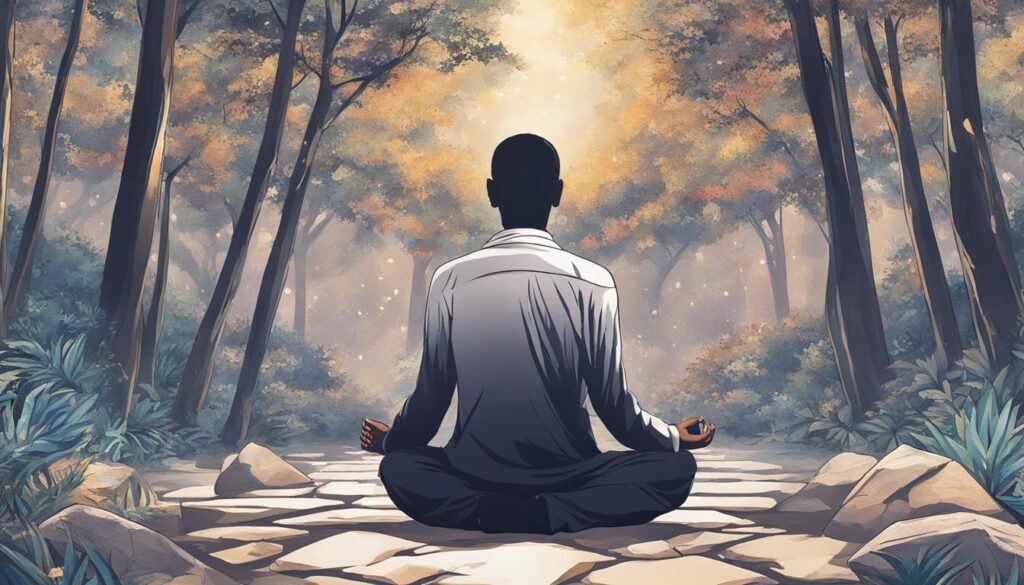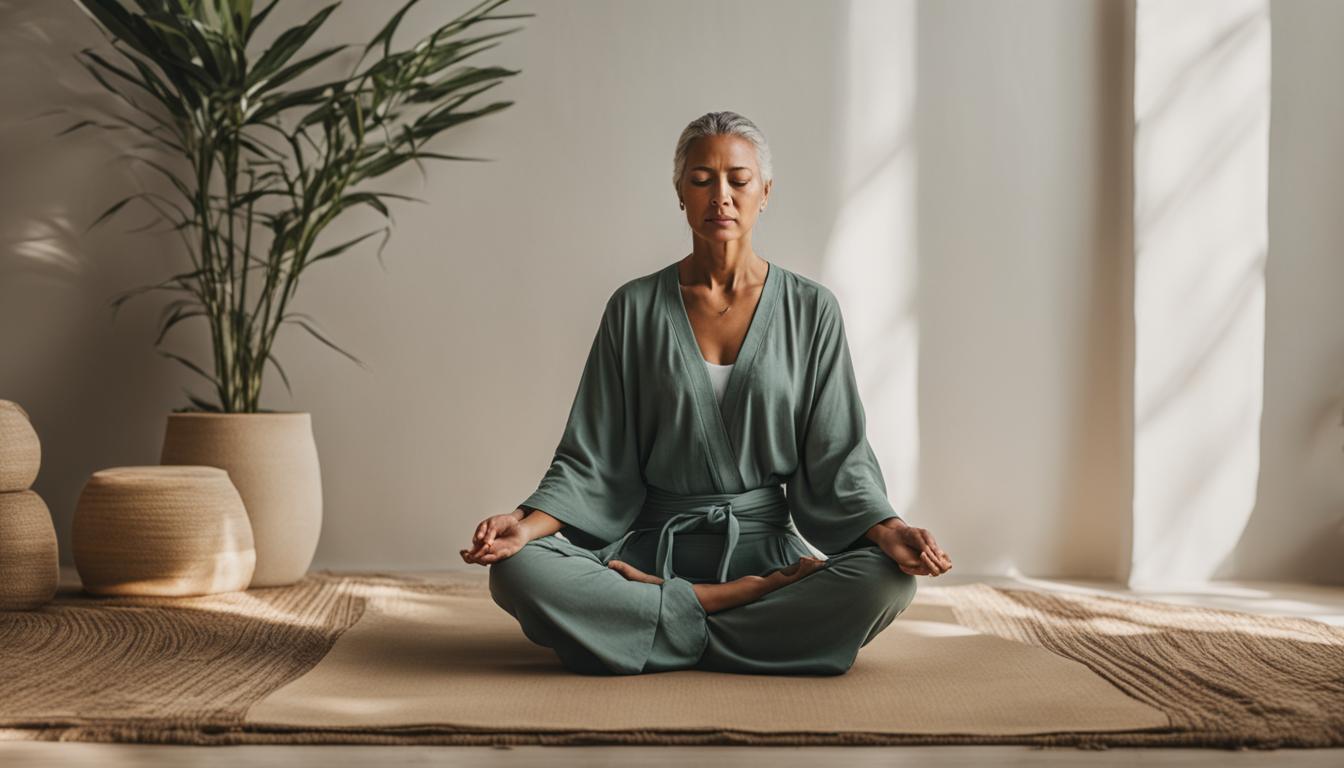Are you ready to embark on a journey of self-discovery and inner peace? Look no further than the guidance of a meditation instructor. With their expertise and support, you can transform your meditation practice and experience the profound benefits it has to offer.
Meditation and mindfulness practices have long been known to bring about a sense of calm and well-being. By incorporating these practices into your daily routine, you can reduce stress, improve focus, and cultivate a greater sense of self-awareness. But sometimes, it can be challenging to find the right approach or maintain consistency in your practice.
This is where a meditation instructor can make all the difference. They are trained to guide you through various meditation techniques, helping you find the one that resonates with you the most. They provide personalized support and encouragement, ensuring that you stay committed and motivated on your meditation journey.
Whether you’re a beginner looking to establish a meditation practice or someone seeking to deepen your existing practice, a meditation instructor can bring new insights and techniques to help you achieve your meditation goals. They can help you navigate obstacles, such as intrusive thoughts or restlessness, by providing practical tools and strategies.
By working with a meditation instructor, you’ll discover the transformative power of meditation and unlock a deep sense of inner peace. So why wait? Take the first step towards a more fulfilling meditation practice by seeking the guidance of a meditation instructor today.
Key Takeaways:
- A meditation instructor can provide personalized guidance and support to transform your meditation practice.
- They can help you find the right meditation techniques that resonate with you.
- A meditation instructor can assist you in overcoming obstacles and staying committed to your practice.
- Working with a meditation instructor can lead to a deep sense of inner peace and personal growth.
- Take the first step on your meditation journey by seeking the guidance of a meditation instructor.
What is Meditation?
Meditation is a practice that involves training the mind to focus and be present in the moment. It has been practiced for thousands of years in various cultures and religions. There are many different types of meditation, but they all involve finding a quiet place to sit or lie down, focusing on your breath or a specific object, and letting go of distracting thoughts. Over time, meditation can help reduce stress, anxiety, and depression, and improve overall well-being.
When you meditate, you learn to observe your thoughts without judgment and gently bring your focus back to the present moment. This training of the mind can have a profound impact on your mental and emotional state, allowing you to cultivate a sense of calm and clarity. By practicing meditation regularly, you can develop greater self-awareness, improve your ability to concentrate, and enhance your overall quality of life.
“Meditation is not about controlling your thoughts; it’s about not letting them control you.”
In today’s fast-paced world, where distractions are plentiful, meditation provides a refuge for quiet introspection and self-reflection. It allows you to step away from the chaos and find inner peace amidst the daily challenges. Through the practice of meditation, you can develop a deeper connection with yourself and gain a better understanding of your thoughts, emotions, and behaviors.
Benefits of Meditation:
- Reduces stress and anxiety
- Improves focus and concentration
- Enhances self-awareness
- Promotes emotional well-being
- Fosters a sense of inner peace
As you embark on your meditation journey, remember that it is a practice that requires patience and consistency. Start with just a few minutes each day and gradually increase the duration as you become more comfortable. The benefits of meditation are not immediate, but with time and dedication, you will begin to experience the transformative power of this ancient practice.
What is Mindfulness?
Mindfulness is a practice that allows you to be fully present and aware of the thoughts, feelings, and sensations in the present moment. It involves paying deliberate attention to your experiences without judgment or attachment. By cultivating mindfulness, you can develop a greater sense of clarity, calmness, and self-awareness.
In mindfulness practice, you gently bring your attention to the present moment, noticing the thoughts and emotions that arise without getting caught up in them. Instead of dwelling on the past or worrying about the future, mindfulness invites you to experience each moment as it unfolds, fully engaged and alive.
“The present moment is the only time over which we have dominion.” – Thích Nhất Hạnh
Mindfulness can be practiced in various ways, such as through meditation, body scans, or mindful movement exercises like yoga or walking. The aim is to become more attuned to your experiences, whether they are pleasant, unpleasant, or neutral, and to cultivate an attitude of curiosity, openness, and acceptance.
Benefits of Mindfulness
Mindfulness has been extensively studied and has been shown to offer a range of benefits to both physical and mental well-being. Research suggests that practicing mindfulness regularly can:
- Reduce stress and anxiety
- Improve focus and concentration
- Enhance emotional resilience and well-being
- Promote better sleep and relaxation
- Strengthen relationships and communication
By incorporating mindfulness into your daily life, you can develop a greater sense of inner peace, improved self-regulation, and a deeper connection to yourself and the world around you. It’s an invaluable tool for navigating the challenges of modern life with greater ease and clarity.
Mindfulness and Meditation
While mindfulness is often associated with meditation, it’s important to note that mindfulness can be practiced in any moment throughout your day. Meditation is one way to cultivate mindfulness by setting aside dedicated time to practice. However, the skills you develop during meditation can also be applied to everyday activities, such as eating, walking, or having conversations.
Through regular mindfulness meditation practice, you can train your mind to become more focused, present, and aware. With time and patience, mindfulness can become a natural state of being that permeates all aspects of your life, leading to greater well-being and a deeper connection to yourself and others.

How Meditation and Mindfulness can Transform Your Personal Growth
Meditation and mindfulness are powerful practices that have the potential to transform your personal growth in profound ways. By incorporating these practices into your daily routine, you can experience a range of benefits that contribute to reducing stress, improving focus, developing self-awareness, and enhancing your relationships with others.
Meditation is a practice that involves training the mind to focus and be present in the moment. With regular practice, it can help reduce stress and anxiety, allowing you to cultivate a greater sense of calm and inner peace. By calming the mind and tuning into your breath or a specific object of focus, you can improve your ability to concentrate and be fully present in your daily activities.
Mindfulness, on the other hand, is a form of meditation that emphasizes being present and aware of your thoughts, feelings, and surroundings without judgment. By practicing mindfulness, you can develop a greater understanding of your own emotions and thought patterns, which can lead to increased self-awareness and personal growth. Additionally, mindfulness can help you cultivate a sense of compassion and empathy towards others, improving your relationships and fostering a sense of connection.
The Benefits of Meditation and Mindfulness for Personal Growth
When you incorporate meditation and mindfulness into your daily routine, you create an opportunity for personal growth in various ways. The consistent practice of these techniques can help you:
- Reduce stress and anxiety, allowing for greater emotional well-being
- Improve focus and concentration, enhancing your productivity and performance
- Cultivate self-awareness and understanding, leading to personal insights and growth
- Enhance relationships with others through increased empathy and compassion
By dedicating time to these practices each day, you are prioritizing your own well-being and personal development. It’s important to view meditation and mindfulness as ongoing processes rather than quick fixes. With patience and persistence, you can experience the transformative power of these practices and unlock your full potential for personal growth.
Getting Started with Meditation and Mindfulness
If you’re interested in incorporating meditation and mindfulness into your daily routine, there are many resources available to help you get started. Whether you’re a beginner or have some experience, these tools can guide you on your journey towards inner peace and personal growth.
1. Find a Meditation App
A meditation app can be a valuable tool for beginners, providing guided meditations and mindfulness exercises. Some popular options include Headspace, Calm, and Insight Timer. These apps offer a variety of meditation styles, from breath awareness to loving-kindness meditation. Download the app that resonates with you and explore its features to begin your practice.
2. Join a Meditation Class
Attending a meditation class is a great way to learn from an experienced instructor and connect with a community of like-minded individuals. Many yoga studios or community centers offer meditation classes, both in-person and online. Check your local listings or search online for classes in your area. Remember, meditation is a personal practice, so find an instructor and class that aligns with your goals and preferences.
3. Read Books on Meditation and Mindfulness
Books are an excellent resource for diving deeper into the practice of meditation and mindfulness. They can provide valuable insights, tips, and step-by-step guidance. Some recommended titles include “The Miracle of Mindfulness” by Thich Nhat Hanh, “10% Happier” by Dan Harris, and “Wherever You Go, There You Are” by Jon Kabat-Zinn. Visit your local bookstore or check online retailers to find a book that resonates with you.
| Resource | Description |
|---|---|
| Meditation App | Provides guided meditations and mindfulness exercises. |
| Meditation Class | Offered both in-person and online, provides instruction and community. |
| Books on Meditation and Mindfulness | Offers insights, tips, and step-by-step guidance. |
4. Set Realistic Goals and Be Patient
When starting your meditation and mindfulness practice, it’s important to set realistic goals and be patient with yourself. Don’t expect to reach a state of deep meditation immediately. Start with just a few minutes each day and gradually increase the duration as you become more comfortable. Remember that the benefits of meditation and mindfulness come with consistent practice, so be persistent and gentle with yourself along the way.
By using these resources, practicing patience, and being consistent, you can embark on your meditation and mindfulness journey with confidence. Whether you choose to use an app, join a class, or read books, remember that the benefits of these practices go beyond the physical realm. They have the power to transform your personal growth and bring you closer to a state of inner peace and well-being.


Create a Sacred Space for Meditation
Before you embark on your meditation journey, it’s essential to create a sacred space where you can find tranquility and focus. Your meditation space should be a quiet and comfortable area that allows you to disconnect from the outside world and connect with your inner self. Here are some tips to help you create a sacred space that promotes peace and serenity:
Choose a Quiet Location
Find a corner of your home or a cozy nook where you can meditate without distractions. Ideally, this space should be away from high-traffic areas and noise. If possible, select a room with natural light, as it can help create a calming atmosphere.
Make it Comfortable
Ensure that your meditation space is comfortable and inviting. Choose a cushion or a chair that supports good posture and allows you to sit comfortably for an extended period. Add blankets or pillows to enhance comfort and help you relax during your practice.
Create a Peaceful Atmosphere
Enhance the ambiance of your meditation space by adding elements that promote peace and tranquility. Consider incorporating soft lighting, such as candles or fairy lights, to create a soothing environment. Use aromatic elements like incense or essential oils to stimulate relaxation and focus.
Add Personal Touches
Add personal touches to your sacred space to make it truly yours. Display objects that hold meaning for you, such as crystals, meaningful quotes, or images that inspire you. These items can serve as reminders of your intentions and help create a deeper connection during your meditation practice.
By creating a sacred space for meditation, you are setting the stage for a more focused and meaningful practice. This dedicated area will help you disconnect from the outside world and fully immerse yourself in the present moment. Remember, your meditation space is a reflection of your inner self, so personalize it in a way that resonates with you.
Conclusion
Meditation and mindfulness are powerful tools that can transform your meditation practice and bring you closer to inner peace and personal growth. By incorporating these practices into your daily routine, you can reduce stress, improve focus and concentration, develop self-awareness, and enhance your relationships with others.
Remember to be patient and persistent in your practice, and over time, you will begin to experience the many benefits of meditation and mindfulness. Take a deep breath, find a quiet place to sit, and begin your journey towards inner peace and personal growth today!
FAQ
What are the benefits of incorporating meditation and mindfulness into your daily routine?
By incorporating meditation and mindfulness into your daily routine, you can reduce stress and anxiety, improve focus and concentration, develop self-awareness, and enhance your relationships with others.
What is meditation?
Meditation is a practice that involves training the mind to focus and be present in the moment. It can help reduce stress, anxiety, and depression, and improve overall well-being.
What is mindfulness?
Mindfulness is a form of meditation that focuses on being present and aware of your thoughts, feelings, and surroundings. It can help improve your ability to cope with stress and anxiety, and cultivate a greater sense of inner peace and well-being.
How can meditation and mindfulness transform personal growth?
Meditation and mindfulness practices can lead to reduced stress and anxiety, improved focus and concentration, greater self-awareness and understanding, and enhanced relationships with others.
How can I get started with meditation and mindfulness?
There are many resources available, such as apps, websites, and books, that can guide you through the process of learning to meditate and practice mindfulness. It’s important to remember that patience and persistence are key.
How can I create a sacred space for meditation?
Find a quiet spot in your home where you can relax without interruptions. Surround yourself with objects that inspire serenity, such as candles, incense, or plants, to create a peaceful environment for your meditation practice.
How can meditation and mindfulness bring inner peace and personal growth?
By incorporating these practices into your daily routine, you can reduce stress, improve focus and concentration, develop self-awareness, and enhance your relationships with others, leading to greater inner peace and personal growth.
Source Links
- https://medium.com/@nurisetianur/finding-inner-peace-how-meditation-and-mindfulness-can-transform-your-personal-growth-f566d8f75405
- https://medium.com/publishous/discover-inner-peace-a-beginners-guide-to-meditation-6fce9a6929a3
- https://www.linkedin.com/pulse/finding-inner-peace-practice-meditation-balancing-your-lafratta




